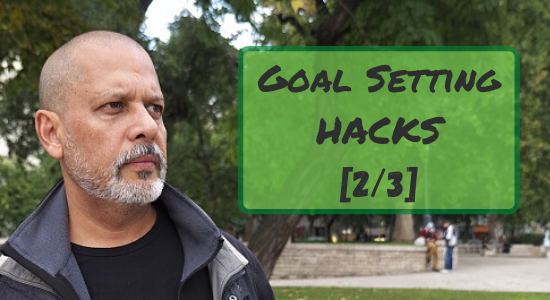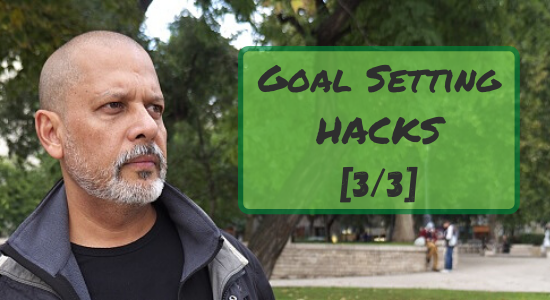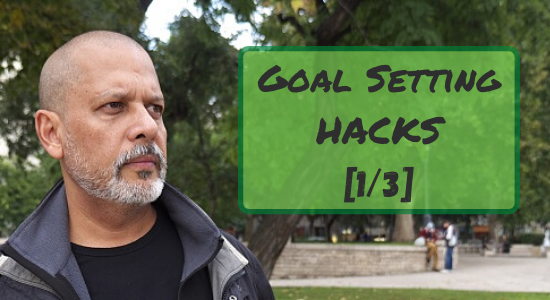Goal Setting Hacks [2/3]
Want to versus Must
You do not get what you want by having a vague idea of your goal. Vague expectations lead to confusion and misfortune and this rule applies to all aspects of your life. In addition, once you know exactly what you want to achieve, you need to know how to collaborate with your brain to get its approval. Some people create a “To Do” list of the things that need to be done and set deadlines next to each task. This is a very good way to keep you focused. When you have a list of the things that need your attention, it will be easier for you to decide which tasks are more important, which one should be taken care of immediately. In addition, when you write something down, it becomes more realistic and you become more disciplined. Having said that, I am still a bit skeptical about the title, “To Do”. In my opinion, it is related to doing things against your will. It is mechanical and may not have the desired effect. I would prefer to change the name to, “Want to do”. So, it’s not to do, but want to do.
Doesn’t it sound better?
Want to do is related to something more pleasant because you feel the urge to do it and you are communicating with the brain in a proper way. Remember, you want to do it. No one is forcing you. Also, when you write down want you want to do, you are forced to consider the reasons for doing so and this gives you additional motivation. For example, “I want to finish the report by noon because my boss needs this before his meeting with top management”. As it is nice to fulfill your boss’s expectations, your brain will have a good argument to start the task. When creating your, “Want to do” list, make sure you add the time of completion because if the brain does not know when you want to finish something, it will not know when to start and procrastination becomes the only option. And whenever you are making a plan, do so the night before because your brain gets enough time to understand where you want to go. If you wait until morning to plan, to prioritize, it may be too late to get the message across to your brain and procrastination takes over. I personally believe that we should go to bed with a plan. In this way, we wake up with a plan and gain momentum right away.
In addition to wanting something you need to be prepared to give something and devise a plan of execution. For example, if you want to lose weight, you need to exercise, increase your walking distance and adjust your eating and drinking habits. It is the same at work. You cannot increase your earnings without rendering proper services and being more cooperative, accessible, visible and interactive.
It is vital for us to understand that we are governed by the brain. If we interact correctly with the brain, we can conquer almost any obstacles and achieve what we desire. So, make it your duty to create a list of things you want to do and you will find yourself becoming more specific, more creative and your goals become clear, meaningful and easier to achieve.
A study was carried out at Harvard related to the power of setting clear, written goals. In 1979, interviewers asked students from the MBA program if they had set clear, written goals for the future and had made plans for their accomplishment. It was noted that 84% had no specific goals, 13% had goals but had not written them down and a meager 3% had clear goals embedded on paper, with plans of how to achieve them. Ten years later, the same graduates were interviewed and the results spoke for themselves. The 3% who had set clear, written goals were making, on average, ten times as much as the other 97% of the class.
Establish a Routine and Instill Self-Denial
In order to develop self-discipline, it is plausible that you need to know the goals you are chasing. However, this is only a part of the process. You need to establish a daily routine that will keep you on the right track. Some people write down their goals and all the values they would bring, but forget to make the commitment to incorporate them into their typical day. If your intention is to lose weight, then it becomes vital to exercise at least 30 minutes per day, drink a lot of water, restrict or eliminate refined carbohydrates from your diet, eat saturated fats and incorporate more vegetables into your diet. Make this an integral part of your daily activities and try your utmost best not to skip a single day for at least the first month. The first month is the worst and your brain will keep challenging you because it wants to revert to the previous situation to which it was programmed.
The alarm clock rings at 6 o’clock in the morning. You are fully aware that you should get out of your warm bed and plunge into your new program. However, you feel the urge to slap the clock into submission or at least manipulate with the snooze button to get another 10 minutes, and then an additional 5 minutes. This is when you test whether you have enough self-discipline to develop your self-discipline. Tell yourself that if this is not the right time to begin, then the right time will never come. You will therefore never be able to prepare yourself mentally to make sacrifices. Unfortunately, success does not come without sacrifice. If this was the case, the whole population of the world would be successful.
Make it a habit to go to sleep earlier. Ask your spouse to kick you out of bed, or even better, tell them to join you in your search for freedom. I personally prefer to condition my brain the night before by turning the idea over and over in my mind before going to sleep. This works perfectly and the subconscious mind has ample time during the night to get used to the new rule. The beginning is always difficult and painful, but force yourself to follow through and you will feel satisfaction. This feeling of fulfillment will allow you to persevere until you have registered the new habit.
You have now learned to resist the temptation of your warm and cozy bed. Do not rest on your laurels. Keep conditioning your mind to do the things you know are essential even though you do not feel like doing so. Stop sweetening your coffee, skip the desserts at the company meeting, and refuse the additional helping that will only serve to expand your stomach. Once you develop the skill to reject, you are on your way to attaining control of yourself.
Identify Obstacles
Obstacles will surely appear on your path to success. The normal unsuccessful person will get frustrated and begin contemplating on irrelevant questions. “Why does this always have to happen to me? Why am I so unlucky?” They will go on to find a scapegoat for their failure, treat this as a good pretext to put their tails between their legs and back off. Remember, if you run away today, you will keep running in the future. In this way, you will never achieve happiness and peace of mind. If you have clearly defined your goal, you should be in a position to predict what obstacles might hinder your progress. By thinking of this in advance, you have ample time to figure out what steps you would have to take to overcome them. Furthermore, your brain gets acquainted with the situation and will react in a better way if the obstacles do eventually appear. Knowing what you can do in a worst case scenario allows you to move forward with determination.
It is obvious that we may not be able to predict all difficulties that may appear on the road to success. However, when you overcome the foreseeable ones, you sharpen your skills to deal with the unpredictable, the unknown. Successful people consider obstacles as a temporary delay. They devote their time and energy to find the root cause of the problem, make amendments and move on. Once you can learn from your mistakes, your path to success becomes less bumpy. Interestingly, the majority of obstacles that appear on the road to success are our own internal obstacles, related to our personality. When you look at yourself in the mirror, you may see your biggest friend or biggest enemy. Get a grip of your inner self and it becomes easier to deal with the external issues.
Goal Setting Hacks [3/3]
Goal Setting Hacks [3/3] Align Goals with Personal Values Personal values are related to the intangible things that are of fundamental importance to us. [...]
Goal Setting Hacks [2/3]
Goal Setting Hacks [2/3] Want to versus Must You do not get what you want by having a vague idea of your goal. Vague [...]
Goal Setting Hacks [1/3]
Goal Setting Hacks [1/3] Acquire what you desire Ask yourself what you truly want in life. Even though it sounds trivial, most people do [...]






![Goal Setting Hacks [3/3]](https://enarstudio.com/wp-content/uploads/2020/05/Goal-Setting-HACKS-3-500x383.png)
![Goal Setting Hacks [1/3]](https://enarstudio.com/wp-content/uploads/2020/04/Goal-Setting-HACKS-1-500x383.png)

Leave A Comment